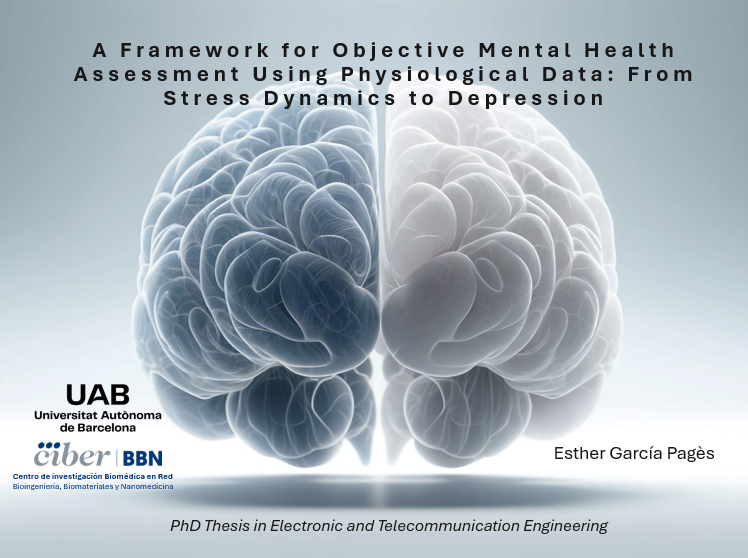Defensa de tesi d'Esther Garcia
Defensa de tesi de Esther García Pagès el pròxim 25 de Juliol a les 12:00h. Sala de Graus de l'Escola d'Enginyeria.

Doctorand: Esther García Pagès.
Títol: A Framework for Objective Mental Health Assessment Using Physiological Data: From Stress Dynamics to Depression.
Directors: Raquel Bailón Luesma
Tutor: Francisco Serra Graells
Data i hora lectura: 25/07/2024, 12:00h.
Lloc lectura: Sala de Graus de l'Escola d'Enginyeria.
Programa de Doctorat: Enginyeria Electrònica i de Telecomunicació.
Departament on està inscrita la tesi: Departament de Microelectrònica.
Abstract
Mental disorders are highly prevalent globally, affecting millions of individuals. They contribute substantially to disability and impose a significant economic burden due to healthcare costs and loss of productivity. Stress plays a pivotal role in mental health, acting as both a trigger and a consequence of mental disorders. Current methods for diagnosing and monitoring mental health disorders are often subjective and prone to biases. Investigating physiological biomarkers associated with stress responses can provide a more objective and reliable approach to assessing mental health.
This research explores the dynamics of physiological stress responses and their implications for mental health, particularly focusing on Major Depressive Disorder (MDD). The main goal is to develop and validate predictive models for the objective and non-invasive evaluation of mental health. The basis for these models are biomarkers of the autonomic nervous system (ANS) to assess the response to stress. These biomarkers are derived from physiological signals such as electrocardiogram (ECG), photoplethysmography (PPG), electrodermal activity (EDA), respiration, and temperature, used as non-invasive tools for mental health evaluation.
A quantitative reference for continuous and non-invasive stress assessment is developed, along with a multiparametric predictive model for depression based on stress dynamics. The results indicate that depression is associated with autonomic imbalance, characterized by reduced sympathetic reactivity and a greater delay in returning to baseline conditions.
A research protocol is proposed for ongoing research to objectively evaluate mental health, automating the evaluation process to make it remotely accessible and effective for clinical and epidemiological use.
Finally, the thesis emphasizes the importance of considering individual variability in stress reactivity and recovery for mental health assessment, proposing objective and non-invasive diagnostic and monitoring strategies. The need to adapt this framework to clinical practice is highlighted, with an emphasis on validating the results with larger and more diverse samples, investigating variability among depression subtypes, and conducting prospective studies to better understand dysfunctions in stress dynamics. Future research is proposed to develop robust physiological biomarkers, integrating passive data from wearables to improve precision and patient adherence.